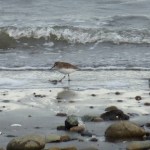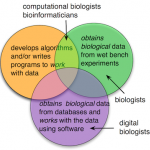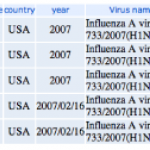DIY biology
Do citizen science efforts ever go beyond "feel good" contributions? Do the data get published in peer-reviewed journals?
In an earlier post, I started a list of citizen science projects that allow students to make a contribution. Many commentors are graciously adding to that list and I thank you all! I'm glad to learn there are so many interesting projects and ways for people to get involved. Science is so empowering!
My question today concerns things like outcomes and deliverables. We'd like to assume that good things are coming from citizen science because people are involved, but I…
"What's in a name? that which we call a rose
By any other name would smell as sweet"
- Juliet, from Romeo and Juliet by William Shakespeare
I realized from the comments on my previous post and from Mike's post that more explanations were in order.
It seems we have two topics - why do we need a new name at all? and why the current names (biologist, computational biologist, bioinformatician, etc.) don't work. What really distinguishes a digital biologist from a regular, garden variety biologist? Why isn't a digital biologist a computational biologist?
So, I brought along two "show and tell…
If you're in Seattle, Dr. Bruce Alberts will be talking tomorrow night (Jan 5th) at the Seattle Aquarium on science education and the role that scientists play.
There are also some really interesting talks at a day-long workshop, Wednesday (Jan 6th) at the UW South Campus Center.
The details and registration info are below:
~ ~ ~ ~ ~ ~ ~ ~ ~ ~ ~ ~ ~ ~ ~ ~ ~ ~ ~ ~ ~ ~ ~ ~ ~ ~ ~ ~ ~ ~ ~ ~ ~ ~ ~ ~ ~ ~ ~ ~ ~ ~ ~ ~ ~
Tuesday:
COSEE Ocean Learning Communities & Washington SeaGrant Present
Redefining Science Education and the
Roles that Scientists Play in Society
Dr. Bruce Alberts
Tuesday,…
I'm a big of learning from data. There are many things we can learn about swine flu and other kinds of flu by using public databases.
In digital biology activity 1, we learned about the kinds of creatures that can get flu. Personally, I'm a little skeptical about the blowfly, but...
Now, you might wonder, what kinds of flu do these different creatures get? Are they all getting H1N1, or do they get different variations? What are H and N anyway?
We can discuss all of these, but for now, lets see what kinds of flu strains infect different kinds of creatures.
Activity 2. What flu infects…
Genome sequences from California and Texas isolates of the H1N1 swine flu are already available for exploration at the NCBI. Let's do a bit of digital biology and see what we can learn.
Activity 1. What kinds of animals get the flu?
For the past few years we've been worrying about avian (bird). Now, we're hearing about swine (pig) flu.
All of this news might you wonder just who gets the flu besides pigs, birds, and humans. We can find out by looking at the data.
Over the past few years, researchers have been sequencing influenza genomes and depositing those genomes in public…
That's how new life forms are created every day in the wild, folks. Human researchers of course have added a few twists on the theme. If we can't induce bacteria or animal cells to collect new bits of DNA on their own, we turn to electroshock therapy. With plants.... aw heck, we just shoot them.
And where did this crazy rant come from you ask? Last Saturday morning, at the crack of 9 am I got to be interviewed on a radio program with two of the main spokespeople from the DIY bio movement, Mackenzie Cowell and Meredith Patterson.
The program was "The Food Chain" (you can listen to it…
I guess I put my foot in it when I wrote that Genome Technology article on DIY Bio. I've already gotten a couple of e-mails today and I can see on the Google groups DIY bio section, that I managed to offend some people by suggesting doing biotechnology successfully at home might mean that you actually have to learn some biology.
Funny, huh?
It's like I suggested something heretical. People have to learn how to program to write software, don't they? I don't see that doing biotechnology as a hobby would be any different.
Anyway, here's my response to the DIY google group critics. I've…
The HudsonAlpha Institute for Biotechnology is a non-profit organization that opened it's doors in April, 2008. One of the great things about this institute is it's commitment to sharing biotech knowledge with the surrounding community.
For the general public, HudsonAlpha has a ongoing written series on biology topics called Biotech 101. Teachers will probably find this useful too. There's a great description of Copy Number Variation written by Dr. Neil Lamb, their director of educational outreach. Some of the other pieces discuss Microarrays, Epigenetics, and RNAi.
School programs…
I don't know if any DIY biologists are looking for projects, but I think engineering yeast with a gene to detect heavy metals might be a good DIY biology project and I have some ideas for how to do this.
What are the advantages of using yeast and working on this kind of problem?
This could have a socially beneficial result. Contamination of soils, water, and even toys with heavy metals like lead, arsenic, and others, is a growing problem. If DIY biologists could make a cheap test, it could be helpful for a large number of people.
Yeast, at least the ones I'm thinking about, Saccharomyces…
Some of the things that are attracting people to DIY biology are:
the idea of doing science with others for fun
the possibility of doing something that might be beneficial to society
being part of larger movement
All of those notions appeal to me and since I've been involved with biotech for many years, I have lots of project ideas. After thinking about the yogurt and melamine detection project, I started to wonder if a DIY project could even have a bigger impact, and say, develop a cheap test for heavy metals like arsenic or lead.
In Seattle, it costs between $30 and $50 to test water…
My oldest daughter's favorite sweatshirt is one from the Seattle Children's Theatre Drama School, with the motto, "What's your motivation?"
I was reminded of motivation the other day, as I talked about projects with the DIY biology group. It's pretty clear that you can't pick a project without knowing whether you're motivated by the discovery or the application.
Many of the people I've known in academia, either researchers or science educators, are motivated by the prospect of discovery. They either want to discover something new or help their students make discoveries. Inquiry-based…
This afternoon, I attended the first meeting of a DIY biology group in Seattle, after a kind invitation from one of the founders.
DIY, for those of you new to the acronym, stands for "Do It Yourself."
But, you say, there are lots of people who do biology on their own. Some people keep pets. Some have children. Others raise tropical fish, go bird watching, or mushroom hunting. Some people even make yogurt or cheese, or brew beer, or make wine. What makes DIY biology so different?
This isn't your grandfather's home brew
Well, lets say for now that it's a little…
Cloning the gene for green fluorescent protein is fun. Lots of fun. Cloners have put the GFP gene into rabbits, plants, cats, fish, and worms, and made mutants that code for proteins in every color of the fluorescent rainbow. Teachers like GFP so much that every year, high school students throughout the U.S. clone GFP in biology class.
Now, some people, who call themselves DIY biologists, have started cloning GFP for fun in their kitchens. Other people find this alarming.
From Yahoo news:
Jim Thomas of ETC Group, a biotechnology watchdog organization, warned that synthetic organisms…



